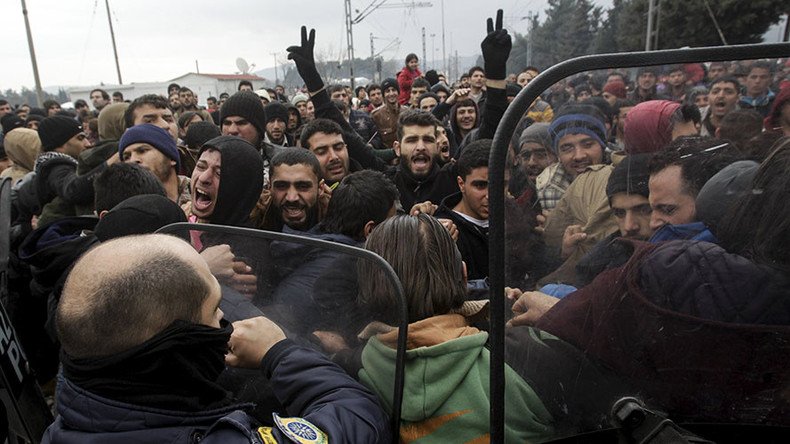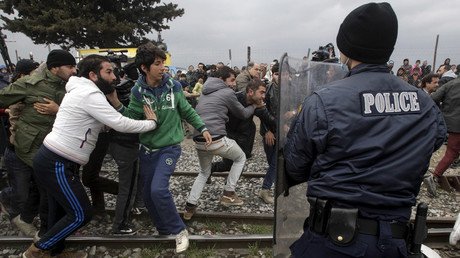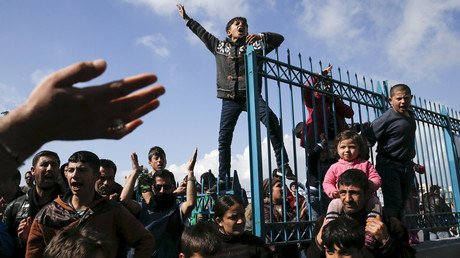EU has resources, lacks political will to resolve ‘critical’ migrant crisis – UNHCR spokesman to RT

The situation in Europe is critical with the migrant crisis turning into a humanitarian one, UNHCR spokesperson William Spindler told RT, noting that the problem requires enough political will and pan-European cooperation to be resolved.
RT: How would you describe the humanitarian situation in Europe right now?
William Spindler: We think the situation is critical. Now we are coming to a situation where we could be really facing a humanitarian crisis in Europe when tens of thousands of desperate people fleeing war, persecution, human rights violations are arriving in Europe asking for protection and they are being received instead with tear gas, with police controls, and with walls and fences. This is not what we would like to see. We would like to see cooperation between Europe. We do not want to see one single country, in this case, Greece, having to deal with this problem that is an international problem and requires European cooperation.
RT: That’s the thing. There are a lot of problems in Europe at the moment, as you said there’s got to be a joint solution. But how can you find one here, because, obviously, it’s very difficult to deal with such a huge influx of people?
WS: Yes, but the reason why this is a crisis is not because of the number of people. Because we have seen the situation in other parts of the world and even in Europe before and it was handled in a much more efficient way. We only have to look at the situation in the former Yugoslavia, for instance, when hundreds of thousands, in fact, millions of people were displaced and many of them found protection in Europe. And that situation was handled in a much better way. If it could be done then, why not now? The resources are there in Europe, what is lacking is political will.
RT: What else can be done in European Union to find way out of the crisis?
WS: We think that we need to work on three different levels. First, we need to look at where these people are coming from. They are coming from countries, such as Syria, Afghanistan, Iraq. We need to help people where they are at the moment. We need to find a political solution to the crisis in Syria. For instance, we need to be able to provide assistance to people inside Syria.
We also need to help those countries that are receiving the vast majority of refugees from Syria, those countries, such as Turkey, Lebanon, Jordan. Those countries need help so that we can stabilize refugees there. And of course, we also need to look at Europe but also the wider world: North America, the rest of the Middle East, Australia and so on.
The rest of the world also needs to solidarize themselves and help. Because if we look at one million refugees and migrants that arrived last year in Europe that is a number that is too big for a single country to deal with but not for the whole of the European Union. If this responsibility was shared then countries would be able to manage. But at the moment very few countries are having to deal with it and this is not possible.
RT: See, that’s the thing: You are hearing from different countries that they have financial problems and they do not have enough resources. So, how do you go about that? They do speak from the real situation that they have there, don’t they?
WS: Well, if we wait until the situation becomes critical ... much more money is necessary. Last year, for instance, the UN was asking for help to help Syrian refugees in countries in the Middle East. But the resources that were necessary were not forthcoming. And, therefore, the UN had to reduce its programs to refugees in places like Turkey, Jordan and Lebanon. As a result, many of those refugees moved to Europe and now Europe has to spend much more, several times more money dealing with the situation on its soil rather than dealing with it where it could have been much more efficient and better, and without people having to risk their lives coming to Europe in the first place. We think it makes sense to help people where they are, to help those countries that are having the biggest responsibility, rather than to wait until people move on.
The statements, views and opinions expressed in this column are solely those of the author and do not necessarily represent those of RT.














